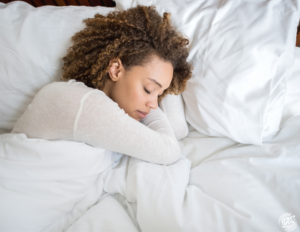Women’s Regenerative Health Treatments

Enhanced Wellness Living, Ridgeland, Mississippi, Functional Medicine Clinic
Kelly Engelmann, Founder, Family Nurse Practitioner, Lead Functional Medicine Nurse Practitioner
Sleep Is Not a Luxury—It’s a Foundation of Wellness
Let’s set the record straight: sleep is not optional, especially for women juggling work, family, hormones, and the pressures of daily life. According to research, women need more sleep than men—yet they are also more likely to suffer from insomnia, restless nights, and sleep disturbances.
So what gives?
From hormone fluctuations to stress overload and adrenal fatigue, women face unique challenges that affect their ability to get restorative sleep. In functional medicine, we view sleep as one of the five Foundations of Wellness, deeply connected to mindset, detoxification, nutrition, hormone balance, and movement.
Let’s dive into the science behind why women need more sleep—and the food-first, natural strategies that can help you get it.
Why Women Biologically Need More Sleep Than Men
Multiple studies have found that women require more sleep than men, sometimes by as much as 20 minutes per night. Why?
Women’s Brains Are Wired Differently
Women’s brains are more active during the day due to multitasking, emotional processing, and more complex neural activity. That higher cognitive load needs more time to recover during sleep.
Hormonal Fluctuations Affect Sleep Cycles
Estrogen and progesterone directly influence sleep quality. From PMS to perimenopause to postpartum changes, hormone fluctuations can wreak havoc on your circadian rhythm.
-
Estrogen helps regulate REM sleep and body temperature.
-
Progesterone has a natural sedative effect and helps promote deeper sleep.
When these hormones are out of balance, women may struggle with night sweats, insomnia, or frequent waking—especially during perimenopause or high-stress periods.
Women Are More Susceptible to Anxiety and Depression
Stress-related conditions like anxiety and depression, which are twice as common in women, are closely linked to sleep disturbances. The body’s stress hormone, cortisol, when elevated at night, blocks melatonin production and prevents restful sleep.
The Vicious Cycle: Stress, Hormones, and Sleepless Nights
Let’s talk about the sleep-stress cycle—a frustrating loop where poor sleep causes stress and stress disrupts sleep. Over time, this loop can lead to:
-
Hormone imbalances (especially cortisol and melatonin)
-
Blood sugar instability
-
Increased inflammation
-
Poor detoxification
-
Fatigue
All of these can lead to more stress and worse sleep.
But there is good news: by supporting your body naturally, you can break this cycle.
How to Actually Get Better Sleep
Here are the top Functional Medicine strategies to help women sleep better—backed by science and rooted in the Foundations of Wellness.
1. Balance Your Blood Sugar to Sleep Through the Night
Why it matters: Blood sugar crashes in the middle of the night cause cortisol to spike, which wakes you up suddenly—often around 2-3 AM.
What to do:
-
Include healthy fats (avocado, olives, coconut oil) and clean protein (pasture-raised chicken, wild-caught fish) with every meal.
-
Avoid refined carbs and sugars after 6 PM.
-
Eat a small fat-and-protein-rich snack before bed if you tend to wake up hungry or anxious.
2. Support Hormone Balance Naturally
Hormones are the silent architects of your sleep cycles. If estrogen, progesterone, or cortisol are out of sync, sleep suffers.
What to do:
-
Prioritize magnesium-rich foods like leafy greens, pumpkin seeds, and cacao to support relaxation.
-
Consider gentle adaptogens like ashwagandha or holy basil (work with a Functional Medicine practitioner to personalize supplements).
-
Avoid blue light and high-intensity workouts after 7 PM—both spike cortisol and delay melatonin production.
3. Create a Calming Evening Ritual
Consistency is key. Your brain craves routine. A soothing ritual signals your body to shift into rest-and-digest mode.
Try this 3-step nightly routine:
-
Dim lights and shut off screens 1 hour before bed.
-
Drink chamomile or lemon balm tea to calm the nervous system.
-
Journal or read something non-stimulating (no emails or true crime podcasts!).
4. Detox Your Sleep Environment
Your bedroom should be a sanctuary for sleep—not a storage room or second office.
Optimize your space with these tips:
-
Use blackout curtains to block street lights and moonlight.
-
Keep the room cool (65–68°F is ideal for most women).
-
Invest in non-toxic bedding and an air purifier to reduce VOCs and allergens.
-
Remove electronics and EMFs from the bedroom (including that blinking router!).
5. Nourish Your Adrenals
The adrenal glands control your stress response. If they’re constantly pumping out cortisol, your sleep will always be disrupted.
What to do:
-
Start your day with protein, not caffeine. Try pastured eggs with sautéed spinach and avocado instead of skipping breakfast and grabbing coffee.
-
Take time for daily nervous system resets like walking in nature, breathwork, or 5 minutes of silence.
-
Avoid over exercising—especially high-intensity evening workouts.
Sleep Support: What to Avoid
Quick fixes that backfire:
-
Over-the-counter sleep aids (can disrupt natural REM cycles)
-
Alcohol (initial sedation gives way to fragmented sleep and liver stress)
-
Relying on melatonin long-term (can throw off your body’s natural production)
Instead, focus on building sleep hygiene, balancing hormones, and nourishing your nervous system—all with a food-first, lifestyle-focused approach.
Functional Medicine Favorites: Foods That Help You Sleep
Support your sleep naturally by adding these sleep-friendly foods to your day:
| Food | Key Benefit |
|---|---|
| Tart cherries | Natural source of melatonin |
| Pumpkin seeds | High in magnesium and tryptophan |
| Wild-caught salmon | Rich in omega-3s to reduce inflammation |
| Leafy greens | Support liver detox for hormone balance |
| Herbal teas (chamomile, lemon balm) | Promote calm and lower cortisol |
Avoid foods that can trigger sleep disturbances, such as:
-
Processed sugars
-
High-sodium packaged meals
-
Caffeine after 2 PM
-
Alcohol in the evening
Final Thoughts: Honor Your Need for Rest
If you’ve been taught to push through exhaustion or “do it all,” this is your permission to pause. Women are biologically wired to need more rest—not less.
In Functional Medicine, we believe true healing happens when the body is in a restorative state. Sleep is your reset button. It’s how your body detoxifies, regulates hormones, processes emotions, and restores energy for the day ahead.
So let’s stop glorifying hustle and start honoring rest. Because when women sleep well, they show up as their strongest, most radiant selves.
Ready to Restore Your Sleep and Reduce Stress?
If you’re ready to address the root causes of your sleep struggles, we’re here to help. At Enhanced Wellness Living, we take a personalized, food-first approach to help you Live Life Well. Fill out our ‘Get Started’ form today and start your journey toward better sleep, balanced hormones, and renewed energy.




